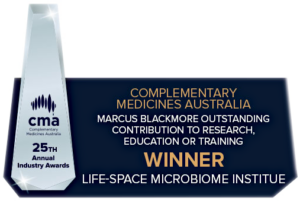Selective serotonin reuptake inhibitors (SSRIs) are a class of medicine commonly prescribed to treat symptoms of depression. First introduced approximately 30 years ago, SSRIs have rapidly become one of the most prescribed medicines in Australia, addressing the growing prevalence of depression.(1, 2)
Despite their popularity, SSRIs remain somewhat of an enigma, due to uncertainties around mechanisms of action, inter-individual differences in response and common side effects affecting various body systems.(3)
SSRIs were first thought to treat depression by increasing synaptic concentrations of serotonin. However, the discovery of the time lag between mechanism of action and therapeutic effect has challenged the central role of serotonin potentiation.(4)
Thanks to growing research relating to the role of the gut-brain axis in depression, attention has turned toward a possible role of the gut microbiome in unravelling the mysteries surrounding SSRIs, including unlocking potential new therapies to improve SSRI efficacy and reduce side effects.
Entering the age of the microbiome-gut-brain axis
The concept of the gut-brain axis is as old as Hippocrates himself (5). However, the modern medicine understanding largely formed in response to the observation of high comorbidity rates of gut disorders with mood disorders. Fast forward to the recent explosion of microbiome research, the gut-brain axis has now evolved to become the microbiome-gut-brain axis (MGBA), a bi-directional communication pathway between the gut and brain involving immune, neural, endocrine and metabolic messengers.(6,7)
As our understanding of the MGBA has evolved, so has our understanding of SSRIs, which has led to several key findings;
- SSRIs act as antibiotics: Antibiotic activity of SSRIs has been shown to induce microbial dysbiosis, which in turn has been linked with gastrointestinal dysfunction, mood imbalances and weight gain – common side effects of SSRIs.(3)
- The role of pharmacomicrobinomics: Preliminary human and animal clinical evidence suggests that certain gut microbiota can affect bioavailability of SSRIs and/or modulate their clinical effect.(8)
- SSRIs and probiotics work better together: A 2021 meta-analysis demonstrated that probiotics can be effective at reducing depressive symptoms when administered in addition to antidepressants.(9) A potential explanation for the benefit is the role of beneficial gut microbiota in regulating inflammation, serotonin production, digestion and metabolism.
Looking to the future
Together, these findings create a promising avenue for future research to not only help improve our understanding of SSRIs and their mechanism of action, but to also unlock new therapeutic tools that can help improve SSRI efficacy, reduce side effects, and optimise patient outcomes.
References
1. https://www.aihw.gov.au/mental-health/overview/prevalence-and-impact-of-mental-illness
2. Australian Prescriber: https://www.nps.org.au/australian-prescriber/articles/top-10-drugs-2020-21
3. Sjöstedt, P., Enander, J. and Isung, J., 2021. Serotonin reuptake inhibitors and the gut microbiome: significance of the gut microbiome in relation to mechanism of action, treatment response, side effects, and tachyphylaxis. Frontiers in Psychiatry, 12, p.682868.
4. Harmer CJ, Duman RS, Cowen PJ. How do antidepressants work? New perspectives for refining future treatment approaches. The Lancet Psychiatry. 2017 May 1;4(5):409-18.
5. Guidolin D, Anderlini D, Maura G, Marcoli M, Cortelli P, Calandra-Buonaura G, Woods AS, Agnati LF. A new integrative theory of brain-body-ecosystem medicine: From the hippocratic holistic view of medicine to our modern society. International Journal of Environmental Research and Public Health. 2019 Sep;16(17):3136.
6. Bear T, Dalziel J, Coad J, Roy N, Butts C, Gopal P. The microbiome-gut-brain axis and resilience to developing anxiety or depression under stress. Microorganisms. 2021 Mar 31;9(4):723
7. Margolis KG, Cryan JF, Mayer EA. The microbiota-gut-brain axis: from motility to mood. Gastroenterology. 2021 Apr 1;160(5):1486-501
8. Brown LC, Bobo WV, Gall CA, Müller DJ, Bousman CA. Pharmacomicrobiomics of antidepressants in depression: A systematic review. Journal of Personalized Medicine. 2023 Jun 30;13(7):1086.
9. Nikolova VL, Cleare AJ, Young AH, Stone JM. Updated review and meta-analysis of probiotics for the treatment of clinical depression: adjunctive vs. stand-alone treatment. Journal of clinical medicine. 2021 Feb 8;10(4):647.

